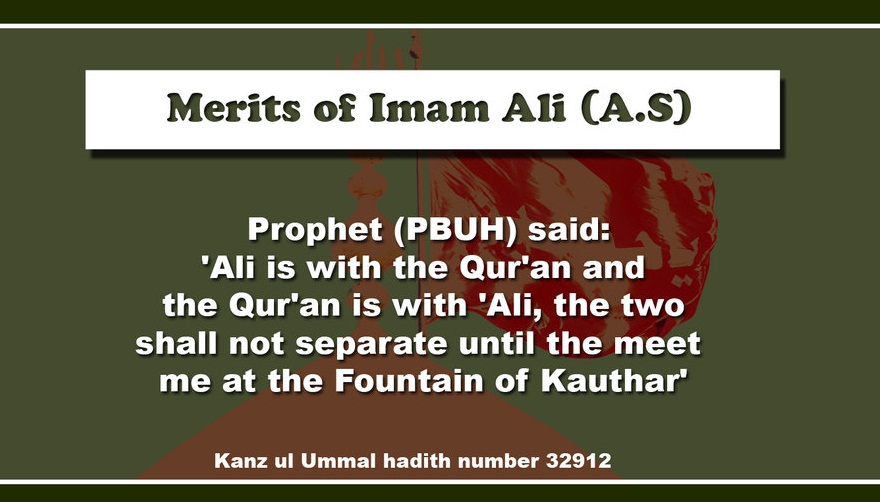This article is going to dealt with the personality of Imam Ali (A) according to the narrations of the holy Prophet Mohammad (S), through referring to the traditions of the Prophet it could be concluded that the apostle of Allah (J) had introduced Ali (A) as his successor before his demise.

According to a number of narrations transmitted from the Holy Prophet (S), Ali (AS) has a special and an exceptional status amongst all other companions of Prophet Mohammad (S). It was because of his rank among the companions that the Prophet (S) appointed him as his successor saying “Of whomsoever I am a master, this Ali is his master ...My Lord, befriend anyone who befriends him and make enmity towards anyone who makes enmity towards him.[1] In another narration the Holy Prophet says, "My Lord, indeed he is to me as Aaron was to Moses, except that there will be no Prophet after me… and of whomsoever I am a guardian, Ali is his guardian." [2]
With that said, a question may arise here that while there were too many companions of the Holy Prophet (S) who could claim to be entitled to this important position, why was Ali (AS) chosen as the successor of the Prophet (S)? The answer to this question is that the successorship of the Prophet (S) is a divine position which means that Almighty Allah (J) Himself must choose His Prophet as well as his caliph. But of course his successor must be qualified like him in terms of knowledge, infallibility, faith, etc. However, the important point in this regard is that the Prophet (S) himself must introduce his successor from among his companions and followers, one who resembles him most and is eligible enough to become his successor.
Many Sunni narrators have narrated several traditions from the Holy Prophet (S), according to which only Ali (AS) is the one who deserves that divine position, since he is the most similar to him. In the following narration, the Prophet (s) says: "The one who wants to live my life and die my death will attach himself to Ali (AS)." [3] In this meaningful tradition the Prophet of Allah (J) introduces Ali (AS) to his nation as a person who is the most similar man to him amongst his other companions. Elsewhere the Prophet (S) said, "The carrier of my flag in this life and the Hereafter is Ali (AS)." [4] According to this saying of the Prophet (S) only Ali (AS) is the one who can carry his flag because just he deserves this status, otherwise the other companions of his could also carry that flag.
Sometimes the Prophet of Allah (J) expressly and explicitly says that "He is the warner, and the guide after Him is Ali (AS)." [5] "Every prophet has an executor and inheritor, and my executor and inheritor is Ali (AS) ".[6] in another tradition the Prophet says: The most knowledgeable person in my nation after me is Ali (AS)." [7] Based on these kind of sayings of the Holy Prophet it becomes categorically clear that Ali (AS) is the only one who can guide Muslim nation after the demise of the Holy Prophet (S), because he is the most knowledgeable person that according to the aforementioned traditions can guide Muslims as a successor of the Prophet (S).
Finally it can be concluded from the aforementioned traditions of the Prophet (S) that he (S) did introduce Ali (AS) as his successor in different narrations. If a Muslim refers to these sayings of the Prophet (S) he would absolutely understand as to why the Prophet (S) has so may times made emphatic utterances regarding Ali (AS) in different situations and places. Had it not been a divine mission to introduce Ali (AS) as his successor to the Muslim nation the Prophet of Allah (J) would have not said these in regards to Ali (AS).
Notes:
[1] Ithbat al-Hudat, vol. 2, p. 42.Mustadrak Al-Sahihain of Al-Hakim Al-Nisabori, 3/129; Kenz Al-Omal, 6/157; Al-Dilmi.
[2] Al-Khesal, vol. 2, p. 44.
[3] Musnad of Ahmad, 5/94; Mustadrak Al-Sahihain of Al-Hakim Al-Nisabori, 3/128; Kenz Al-Omal, 6/217; Al-Tabarani.
[4] Kenz Al-Omal, 6/122; Al-Tabari, 2/201; Al-Khawarizmi, 250; Al-Fadha'il of Ahmad, 253; Ibn Al-Maghazeli, 42/200.
[5] Musnad Ahmad, 1/151; Al-Tirmidhi, 2/135; Al-Khasa'is of Al-Nisa'I, 20; Kenz Al-Omal, 1/247; Ibn Al-Maghazeli, 222.
[6] Kenz Al-Omal, 6/158; Tarikh Baghdad of Al-Khateeb Al-Baghdadi, 11/173; Shawahid Al-Tanzil, 2/223; Yanabi Al-Mawda, 94.
[7] Manaqib Al-Imam Ali IbnAbiTAlib (AS) of Ibn Al-Maghazeli Al-Shafi'i.




نظرات
I do accept as true with all the ideas you've offered in your post.
They're really convincing and will certainly work.
Still, the posts are very quick for newbies.
May you please prolong them a bit from next time?
Thank you for the post.
Thanks for sharing such a nice idea, piece of writing is nice, thats why i have read it entirely
I am in fact thankful to the owner of this site who has shared this enormous paragraph at at this time.